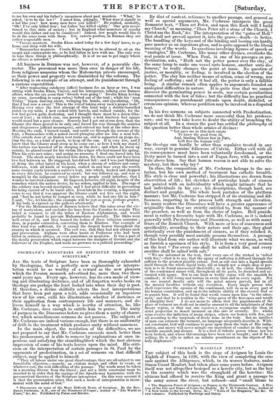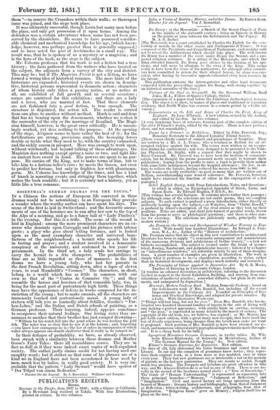IISBORNE'S MAGICIAN PRIEST. * THE subject of this book is the
siege of Avignon by Louis the Eighth of France, in 1226, with the view of completing the cru- sade against the !Albigenses, which, in its worser features, under Simon Count Monfort, had taken place some years before. Avignon itself was not altogether besieged as a heretic city, but as the key to the country which was the stronghold of the heretics : the citizens had offered to receive the King and grant a passage to the army across the river, but refused—and "small blame to • The Magician Priest of Avignon; or Popery in the Thirteenth Century. A His- tory of the Life and Times of Louis the Eighth. By T. H. Usborne, Esq., Author of '‘ A New Guide to the Levant, Syria, &c.,' Tales of the Braganza," &c. &c. In two volumes. Published by Partridge and Oakey.
them "—to receive the Crusaders within their walls; so thereupon issue was joined, and the siege took place. It was ultimately successful, though Louis lost many men before the place, and only got possession of it upon terms. Among the defenders was a certain adventurer whose name has not been pre- served by the chroniclers. He seems to have possessed consider- able chemical and mechanical knowledge for his age, (which know- ledge, however, was perhaps greater than is generally supposed,) and to have acted the part of Archimedes in a small way. The result was, that he is spoken of as a mystery or a magician ; and is the hero of the book, as the siege is the subject.
Mr. ITsborne professes that his work is not a fiction but a true history ; the facts gathered from the writers who have treated on the subject, the adjuncts from a survey of the city and district. This may be ; but if The Magician Priest is not a fiction, we have formed a wrong idea of historical romance. The mere hints of the historians are expanded ; historical events are shown in descrip- tive, historical persons represented in dramatic action ; characters of whom history only takes a passing notice, or no notice at all, are exhibited at full growth and on several occasions ; scenes are contrived for this exhibition ; and there are a lady and a lover, who are married at last. That these elements are not fashioned into a good fiction, is true enough. The structure is disjointed, the action nil. The reader is carried from one place to another without method. Much is said and done that has no bearing upon the denouement, whether we reckon it the surrender of the city or the marriage of Rosalind. The Magi- cian himself, however, is the great error critically. He is unceas- ingly worked, yet does nothing to the purpose. At the opening of the siege, Avignon seems to have rather the best of it ; for the fortifications are strong, provisions ample, the besieging forces double or treble what they need to be, with the country exhausted, and the sickly season in prospect. Here was enough to work upon, without witchcraft; but beyond talking of these advantages, the Magician does nothing except spring a mine or two, and fight like an ancient hero sword in hand. His powers are spent to no pur- pose. He carries of the King, not to make terms of him, but to take him to a fortune-teller's cave : he meets the Queen, not even to predict her fortune, but only to frighten her with phantasma- goria. Mr. Usborne has knowledge of the times, and has a kind of knack in narrating events and stringing them together, which makes the book readable ; but it is certainly not a history, yet as little like a true romance.



























 Previous page
Previous page